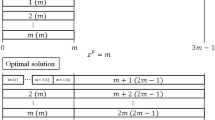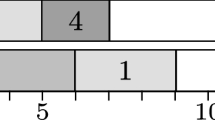Abstract.
We study the problem of scheduling a set of n independent parallel tasks on m processors, where in addition to the processing time there is a size associated with each task indicating that the task can be processed on any subset of processors of the given size. Based on a linear programming formulation, we propose an algorithm for computing a preemptive schedule with minimum makespan, and show that the running time of the algorithm depends polynomially on m and only linearly on n. Thus for any fixed m, an optimal preemptive schedule can be computed in O(n) time. We also present extensions of this approach to other (more general) scheduling problems with malleable tasks, due dates and maximum lateness minimization.
Similar content being viewed by others
Author information
Authors and Affiliations
Additional information
Received: November 1999 / Accepted: November 2002 Publication online: December 19, 2002
RID="⋆"
ID="⋆" This work was done while the authors were associated with the research institutes IDSIA Lugano and MPII Saarbrücken and were supported in part by the Swiss Office Fédéral de l'éducation et de la Science project n 97.0315 titled ``Platform'' and by EU ESPRIT LTR Project No. 20244 (ALCOM-IT)
Rights and permissions
About this article
Cite this article
Jansen, K., Porkolab, L. Computing optimal preemptive schedules for parallel tasks: linear programming approaches. Math. Program., Ser. A 95, 617–630 (2003). https://doi.org/10.1007/s10107-002-0361-7
Issue Date:
DOI: https://doi.org/10.1007/s10107-002-0361-7




